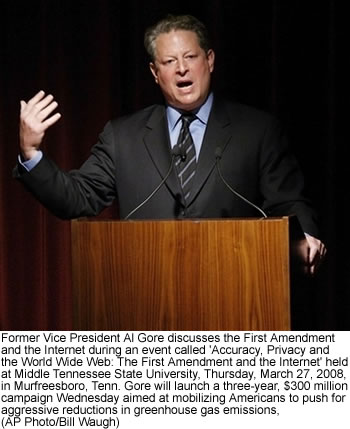The Alliance for Climate Protection’s “we” campaign will employ online organizing and television advertisements on shows ranging from “American Idol” to “The Daily Show with Jon Stewart.” It highlights the extent to which Americans’ growing awareness of global warming has yet to translate into national policy changes, Gore said in an hour-long phone interview last week. He said the campaign, which Gore is helping to fund, was undertaken in large part because of his fear that U.S. lawmakers are unwilling to curb the human-generated emissions linked to climate change.
“This climate crisis is so interwoven with habits and patterns that are so entrenched, the elected officials in both parties are going to be timid about enacting the bold changes that are needed until there is a change in the public’s sense of urgency in addressing this crisis,” Gore said. “I’ve tried everything else I know to try. The way to solve this crisis is to change the way the public thinks about it.”
Private contributors have already donated or committed half the money needed to fund the entire campaign, he said. While Gore declined to quantify his contribution to the effort, he has devoted all his proceeds from the Oscar-winning documentary “An Inconvenient Truth,” the best-selling companion book, his salary from the venture capital firm Kleiner Perkins Caulfield & Byers and several international prizes, such as the 2007 Nobel Peace Prize, which add up to more than a $2.7 million. Paramount Classics, the documentary’s distributor, has pledged 5 percent of the film’s profits to the group, and some of the money raised through the 2007 Live Earth concerts will help the campaign, along with Gore’s proceeds from an upcoming book on climate change.
While “An Inconvenient Truth” urged viewers to fully inflate their car tires and to install compact fluorescent light bulbs to combat global warming, Gore said he is now focused on ensuring that the United States enacts a national carbon emission cap and ratifies a new global pact on climate change in the next three years.
“The simple algorithm is this: It’s important to change the light bulbs, but it’s much more important to change the laws,” he said. “The options available to civilization worldwide to avert this terribly destructive pattern are beginning to slip away from us. The path for recovery runs right through Washington, D.C.”
The new effort comes at a time when the three remaining major party presidential candidates — Sens. John McCain (R-Ariz.), Hillary Rodham Clinton (D-N.Y.) and Barack Obama (D-Ill.) — have all endorsed federal limits on greenhouse gases, virtually ensuring that the next occupant of the White House will offer a sharp break from President Bush’s climate policy.
All three have discussed global warming with Gore in phone calls over the course of the past few months. While McCain backs a more modest plan than that favored by the Democrats — he supports a 60 percent reduction in greenhouse gases from 1990 levels by 2050, compared with Obama and Clinton’s vow of an 80 percent cut during that period — the presumptive Republican nominee emphasized during a recent stop in Chula Vista, Calif., that he had pushed for a federal cap-and-trade system before either of his opponents came to the Senate.
“Neither have proposed legislation or played any public role during their time in the Senate,” McCain said, sidestepping the fact that Clinton and Obama both back climate legislation, up for a Senate vote in June, that he has yet to endorse.
Gore, who backs a 90 percent reduction in greenhouse gases by mid-century, said that while he’s “encouraged” that the remaining candidates back mandatory limits on greenhouse gases, they still need to be pushed: “What happens after the election will depend on whether or not we win enough hearts and minds in the country as a whole.”
And former Rep. Sherwood L. Boehlert (R-N.Y.), a board member of the two-year-old alliance, said the candidates’ commitment to a cap-and-trade system does not negate the fact that the majority of Americans fail to see climate change as a compelling political issue.
“Most Republicans, along with most Democrats, are focused almost exclusively on Iraq, the war against terrorism and the economy,” Boehlert said. “That leaves little room for anything else.”
In an effort to penetrate Americans’ consciousness and change lawmakers’ political calculus, the group aims to enlist 10 million volunteers through a combination of network and cable commercials, display ads in magazines ranging from People to Real Simple, and online social networks. By contrast, the civil rights and antiwar movements in the 1960s each boasted about 5 million activists.
Cathy Zoi, the Alliance for Climate Protection’s chief executive, said the group will focus on individuals known in the advertising world as “influencers” who talk to a disproportionate number of people in their communities. While some ads will target inside-the-Beltway policymakers, the bulk of their efforts will focus on the general public.
“This is modern organizing,” Zoi said, adding that the campaign aims to convince voters that “this is a solvable problem.”
In an effort to broaden the campaign’s appeal, the alliance has already forged working partnerships with groups including the Girl Scouts and the United Steelworkers of America. One of its early ads will feature the unlikely alliance of clergymen Pat Robertson and Al Sharpton sitting on a couch on Virginia Beach, talking about their commitment to address climate change.
Its first ad, which is narrated by the actor William H. Macy, highlights American’s collective responses to historical challenges. “We didn’t wait for someone else to storm the beaches of Normandy,” Macy intones. “We didn’t wait for someone else to guarantee civil rights.” The commercial will run several times Wednesday on shows such as “Good Morning America,” “Today,” “American Idol,” “Larry King Live” and “Anderson Cooper 360.”
League of Conservation Voters president Gene Karpinski, whose group is supporting the effort, said he’s optimistic the “we” campaign will succeed in a way that traditional environmental groups have not. “It heightens both the urgency and the sense we can get the job done with the broad middle that will make the difference,” Karpinski said, “while having the resources to communicate in a sophisticated way, in a more expansive fashion than the community has done before.”
Without question, the campaign represents one of the most far-reaching public advocacy initiatives in recent years. The American Legacy Foundation, an anti-smoking campaign that arose out of the massive 1998 tobacco settlement, made $100 million in ad buys its first year, but its funding quickly dwindled and it now spends $30 million annually. The Ad Council — which runs public service announcements ranging from the “Just Say No” anti-drug message to the “Smokey the Bear” commercials — receives an average of $40 million a year in donated media for the 50 campaigns it operates and only occasionally hits the $100 million annual mark for its campaigns.
The climate alliance’s initiative, however, will not go unchallenged by climate change skeptics. Americans for Balanced Energy Choices, a nonprofit funded by the coal industry and its allies, is spending about $35 million this election to bolster support for coal-generated electricity. The Competitive Enterprise Institute, a Washington-based think tank that receives part of its funding from oil and gas companies, recently spent close to $35,000 to run a television ad both in the District and in scattered cities throughout the country attacking Gore, and plans a follow-up campaign. The ad argues that Gore and his allies in Hollywood use plenty of energy but that “Al Gore wants to cut our energy use, putting our jobs and our future in jeopardy.”
Myron Ebell, who directs energy and global warming policy for CEI, said the fact that Gore feels compelled to run such an elaborate ad campaign highlights the extent to which his conservation message has failed to resonate with the American public. “He’s spending a hundred million dollars to convince the American people to make sacrifices that he and his elite friends are not willing to make,” Ebell said, adding that while many Americans may now blame humans for causing climate change, “the American people are not there with other alarmists” when it comes to supporting deep cuts in greenhouse gas emissions.
John Podesta, president of the progressive think tank Center for American Progress, said the fact that independent groups are already advertising on the issue underscores how much more politically relevant climate change is in the 2008 election, especially because Congress is unlikely to send a bill to Bush for signing this year. It is unclear whether the Senate has 60 votes to pass a cap-and-trade bill this summer, and the House Energy and Commerce Committee has yet to produce a companion climate bill.
“This will be played out on the candidate level, but also among an array of parties who have a stake in the outcome,” Podesta said. “Without presidential leadership, you’re left with a regional division and a partisan division [in Congress] that’s likely to produce movement, but not the bold kind of change that’s needed. You need a president for that.”
Staff researcher Magda Jean-Louis contributed to this report.
© 2008 The Washington Post

